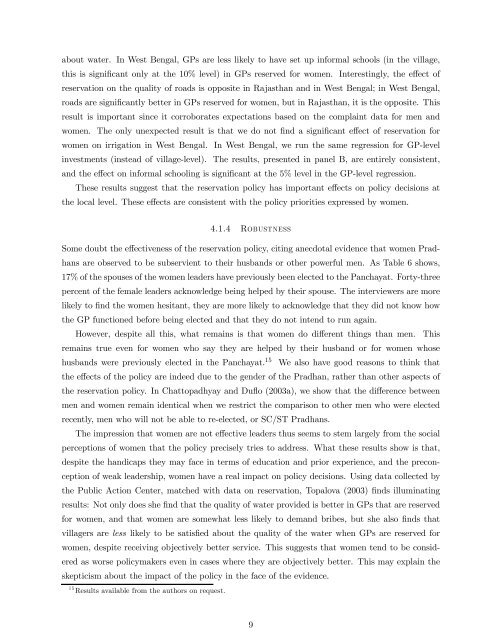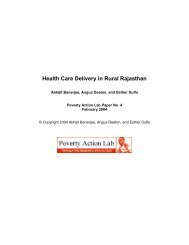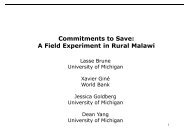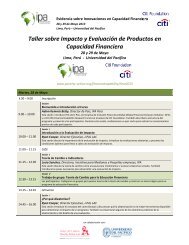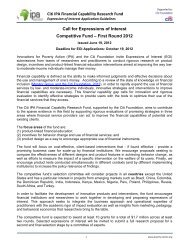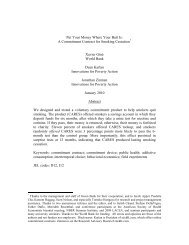The Impact of Reservation in the Panchayati Raj - Innovations for ...
The Impact of Reservation in the Panchayati Raj - Innovations for ...
The Impact of Reservation in the Panchayati Raj - Innovations for ...
You also want an ePaper? Increase the reach of your titles
YUMPU automatically turns print PDFs into web optimized ePapers that Google loves.
about water. In West Bengal, GPs are less likely to have set up <strong>in</strong><strong>for</strong>mal schools (<strong>in</strong> <strong>the</strong> village,this is significant only at <strong>the</strong> 10% level) <strong>in</strong> GPs reserved <strong>for</strong> women. Interest<strong>in</strong>gly, <strong>the</strong> effect <strong>of</strong>reservation on <strong>the</strong> quality <strong>of</strong> roads is opposite <strong>in</strong> <strong>Raj</strong>asthan and <strong>in</strong> West Bengal; <strong>in</strong> West Bengal,roads are significantly better <strong>in</strong> GPs reserved <strong>for</strong> women, but <strong>in</strong> <strong>Raj</strong>asthan, it is <strong>the</strong> opposite. Thisresult is important s<strong>in</strong>ce it corroborates expectations based on <strong>the</strong> compla<strong>in</strong>t data <strong>for</strong> men andwomen. <strong>The</strong> only unexpected result is that we do not f<strong>in</strong>d a significant effect <strong>of</strong> reservation <strong>for</strong>women on irrigation <strong>in</strong> West Bengal. In West Bengal, we run <strong>the</strong> same regression <strong>for</strong> GP-level<strong>in</strong>vestments (<strong>in</strong>stead <strong>of</strong> village-level). <strong>The</strong> results, presented <strong>in</strong> panel B, are entirely consistent,and <strong>the</strong> effect on <strong>in</strong><strong>for</strong>mal school<strong>in</strong>g is significant at <strong>the</strong> 5% level <strong>in</strong> <strong>the</strong> GP-level regression.<strong>The</strong>se results suggest that <strong>the</strong> reservation policy has important effects on policy decisions at<strong>the</strong> local level. <strong>The</strong>se effects are consistent with <strong>the</strong> policy priorities expressed by women.4.1.4 RobustnessSome doubt <strong>the</strong> effectiveness <strong>of</strong> <strong>the</strong> reservation policy, cit<strong>in</strong>g anecdotal evidence that women Pradhansare observed to be subservient to <strong>the</strong>ir husbands or o<strong>the</strong>r powerful men. As Table 6 shows,17% <strong>of</strong> <strong>the</strong> spouses <strong>of</strong> <strong>the</strong> women leaders have previously been elected to <strong>the</strong> Panchayat. Forty-threepercent <strong>of</strong> <strong>the</strong> female leaders acknowledge be<strong>in</strong>g helped by <strong>the</strong>ir spouse. <strong>The</strong> <strong>in</strong>terviewers are morelikely to f<strong>in</strong>d <strong>the</strong> women hesitant, <strong>the</strong>y are more likely to acknowledge that <strong>the</strong>y did not know how<strong>the</strong> GP functioned be<strong>for</strong>e be<strong>in</strong>g elected and that <strong>the</strong>y do not <strong>in</strong>tend to run aga<strong>in</strong>.However, despite all this, what rema<strong>in</strong>s is that women do different th<strong>in</strong>gs than men. Thisrema<strong>in</strong>s true even <strong>for</strong> women who say <strong>the</strong>y are helped by <strong>the</strong>ir husband or <strong>for</strong> women whosehusbands were previously elected <strong>in</strong> <strong>the</strong> Panchayat. 15 We also have good reasons to th<strong>in</strong>k that<strong>the</strong> effects <strong>of</strong> <strong>the</strong> policy are <strong>in</strong>deed due to <strong>the</strong> gender <strong>of</strong> <strong>the</strong> Pradhan, ra<strong>the</strong>r than o<strong>the</strong>r aspects <strong>of</strong><strong>the</strong> reservation policy. In Chattopadhyay and Duflo (2003a), we show that <strong>the</strong> difference betweenmen and women rema<strong>in</strong> identical when we restrict <strong>the</strong> comparison to o<strong>the</strong>r men who were electedrecently, men who will not be able to re-elected, or SC/ST Pradhans.<strong>The</strong> impression that women are not effective leaders thus seems to stem largely from <strong>the</strong> socialperceptions <strong>of</strong> women that <strong>the</strong> policy precisely tries to address. What <strong>the</strong>se results show is that,despite <strong>the</strong> handicaps <strong>the</strong>y may face <strong>in</strong> terms <strong>of</strong> education and prior experience, and <strong>the</strong> preconception<strong>of</strong> weak leadership, women have a real impact on policy decisions. Us<strong>in</strong>g data collected by<strong>the</strong> Public Action Center, matched with data on reservation, Topalova (2003) f<strong>in</strong>ds illum<strong>in</strong>at<strong>in</strong>gresults: Not only does she f<strong>in</strong>d that <strong>the</strong> quality <strong>of</strong> water provided is better <strong>in</strong> GPs that are reserved<strong>for</strong> women, and that women are somewhat less likely to demand bribes, but she also f<strong>in</strong>ds thatvillagers are less likely to be satisfied about <strong>the</strong> quality <strong>of</strong> <strong>the</strong> water when GPs are reserved <strong>for</strong>women, despite receiv<strong>in</strong>g objectively better service. This suggests that women tend to be consideredas worse policymakers even <strong>in</strong> cases where <strong>the</strong>y are objectively better. This may expla<strong>in</strong> <strong>the</strong>skepticism about <strong>the</strong> impact <strong>of</strong> <strong>the</strong> policy <strong>in</strong> <strong>the</strong> face <strong>of</strong> <strong>the</strong> evidence.15 Results available from <strong>the</strong> authors on request.9


